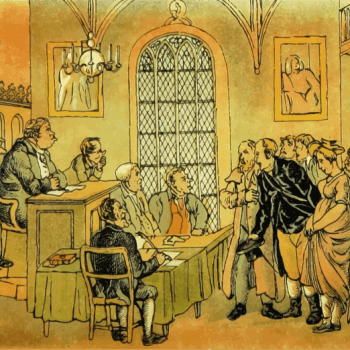I have blogged about the case in Finland of Lutheran pastor Juhana Pohjola, who, along with physician and member of parliament Päivi Räsänen, will be tried for hate speech for publishing a pamphlet teaching what the Bible says about homosexuality.
Worldwide confessional Lutheranism has spoken out on the matter with a powerful statement entitled A Protest and Call for Free Religious Speech in Finland: An International Lutheran Condemnation of the Unjust Criminal Prosecution of the Rev. Dr. Pohjola and Dr. Räsänen, and a Call for All People of Goodwill to Support the Freedom of Religious Expression in Finland.
I urge you to read it, along with the list of signatories from around the world.
We’ve already discussed the case, but I want to draw your attention to the way the statement distinguishes between the authority of the state and the authority of the church.
It gives a distinctively Lutheran approach to the issue, drawing on the Augsburg Confession, but it shows that the doctrine of the Two Kingdoms, far from encouraging an uncritical submission to temporal governments, offers a framework for positive religious and, indeed, intellectual liberty. It also repudiates both totalitarianism on the part of the state and theocratic rule on the part of the church. And it offers guidelines for some of church and state issues that we face today.
Here are the relevant paragraphs (my bolds and interposition):
The Augsburg Confession (AC) states that the Gospel
does not overthrow civil authority, the state, and marriage, but requires that all these be kept as true orders of God, and that everyone, each according to his own calling, manifest Christian love and genuine good works in his station of life. [Note the doctrine of vocation.] Accordingly, Christians are obliged to be subject to civil authority and obey its commands and laws in all that can be done without sin. (AC XVI, Romans 13:1-7)
But authority holds only in its own jurisdiction. The government holds sway over externals, the Word of god over internals. “The civil magistrate protects not minds but bodies and goods from manifest harm. The Gospel protects minds from ungodly ideas, the devil, and eternal death. Consequently, the powers of church and civil government must not be mixed” (AC XXVIII). Since faith must remain free, AC XVI concludes that when the commands of government cannot be obeyed without sin, “we must obey God rather than men (Acts 5:39).”
These principles would apply to other issues. For example, today many Christians, including many Lutherans, are rejecting the state’s authority to require masks and other anti-COVID measures. Well, protecting bodies from manifest harm would seem to fall under the authority of the state. That would hold true even if we think the reasons for those requirements are ill-founded. The government, however, should not punish our inner thoughts about such measures. Even if we disagree with mask-wearing requirements, we should probably submit to our government authorities in this, since wearing a mask and social distancing are not sins, as such.
Vaccination mandates are different. Some Christians, in good conscience, refuse to get vaccinated because they believe the use of abortion-derived stem cells associated with certain vaccines, however remote the connection might be, makes the vaccines sinful. That inner conviction could be a matter of religious liberty. Some people refuse to get vaccinated on prudential grounds, because they don’t think the vaccines are safe. That wouldn’t involve religious liberty, as such, but they could make the case that they have a right to act upon their internal ideas, over which the government holds no sway. Christians could disagree with each other on issues like that, and they would always need to determine what is best not only for themselves but how they can best “manifest Christian love” to their neighbors.
And state mandates to shut the doors of churches are certainly different, even when the state is trying to protect “not minds but bodies and goods from manifest harm.” For one sphere to cancel the other would violate the principle that “the powers of church and civil government must not be mixed.”
To be sure, this distinction is not always easy to apply, and it doesn’t account for all of the issues. Our minds control what our bodies do, so our mental liberty must manifest itself in our external actions. Still, the Augsburg Confession gives us a remarkably early assertion of intellectual freedom and the boundaries of the state. It would, for example, rule out prosecution for “hate crimes.” The state can and should punish external actions that harm the “bodies and goods” of someone else. It should not, however, prosecute “hate crimes,” since it has no control or jurisdiction over citizens’ inner emotion of who they hate. Only the gospel can get at that, not by threats of the law even then, but by working the inner transformation of faith that enables us to love our neighbors.
Am I applying the principles of the Augsburg Confession correctly here? (Note that the test of believing a doctrine is accepting it even when it goes against one’s own inclinations.) How else might these principles be applied, as churches and individual Christians try to sort out their relationship to the state?
Photo: “Church and State” by Lee Coursey, via Flickr, Creative Commons 2.0


















